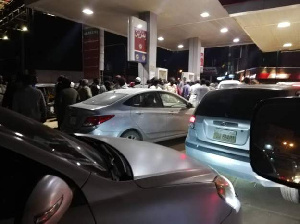Nigeria’s fuel shortage and a month-long power blackout have converged into a perfect storm scenario, paralysing the economy of Africa’s most populous country, causing social anxiety and raising questions about the country’s self-sufficiency in a resource it produces.
As the sixth world crude oil producer, with a significant chunk of gas reserves, Nigeria has been struggling to provide sufficient and affordable energy to citizens for almost two decades now. And with the international oil market reaction to the Russian invasion of Ukraine, images of fuel stations with long queues facing empty pumps have become the order of the day.
The situation has extended to the aviation sector, as jet fuel has also become scarce, forcing airlines to cut flights or increase ticket prices. Meanwhile, economic activities are grinding to a halt as small, medium and large-scale businesses hitherto dependent on petrol and diesel because of unreliable electricity supply have reduced production.
A welder, Innocent Okpara, lamented: “Lack of electricity affects my work. I now depend only on a generator, but there is no petrol to power the generating set. Filling stations are asking us to bring our generators physically to be filled at the pumps. This is preposterous,” he said.
Initially attributed to the withdrawal from circulation of the imported adulterated petrol in early February, petrol scarcity has lingered for over a month now despite assurances that the country had been flooded with the product. The government has failed to offer an adequate explanation, frustrating the public even further.
Ordinary citizens are suffering. Rose Ademua, a civil servant in Abuja, lamented: “There is no light, no fuel, the situation is terrible and we are appealing to the government for quick intervention before people die of hunger.”
Nigeria produces 1.2 million barrels of crude oil, but exports it all as its four refineries in Port Harcourt, Warri and Kaduna are derelict and out of commission. It now depends on the importation of all refined petroleum products.
Electricity outage has compounded the situation, paralysing major commercial and industrial cities across the 36 states and the Federal Capital Territory (FCT) in Abuja.
Mele Kyari, the group managing director of Nigeria National Petroleum Corporation (NNPC), attributed the current petrol shortage to hoarding and panic buying, while assuring the public in an address to oil stakeholders (National Union of Petroleum and Natural Gas Workers), Petrol Tanker Drivers, Depot and Petroleum Marketers Association of Nigeria and Major Oil Marketers Association of Nigeria.
The petrol crisis got worse when Nigerian Midstream and Downstream Petroleum Regulatory Authority (NMDPRA) confirmed in February that methanol above national specification was imported amid efforts to recall the off-spec petrol from circulation.
Street racketeers are selling a litre of petrol for between N300 ($0.45) and N500 ($0.50) as against the official price of between N162 ($0.35) and N165 ($0.36).
A taxi driver in Abuja, Alabi Adams said, “I have spent two nights at the fuel station without getting a drop of petrol. I cannot buy in the black market.” And one understands why.
Lanre Popoola, the chairman of the Manufacturers Association of Nigeria wants urgent government intervention to support the production of goods. “There is no power supply, and there is no diesel to power generating sets,’’ he said.
Meanwhile, President Muhammadu Buhari, who is also the Petroleum minister, submitted a supplementary budget of N2.557 trillion ($5 billion) to the National Assembly to accommodate fuel subsidy payments until June 2023 when subsidies would be dropped.
Electricity distribution companies are overwhelmed by low power generation and incessant failure of the national grid. The 16 power generation companies (GenCos) have accused the government of not meeting its financial obligations to them.
Dr Joy Ogaji Gen, the executive secretary of the Association of Power Generation Companies Cos said they are unable to maintain their machines and pay gas suppliers which have resulted in low power generation.
The power plants now generate just 2,535 Megawatts, far below the minimum national requirement of 5,000 megawatts hitherto pumped into the national grid.
“The moment the government pays the debt, we will pay our gas suppliers, we will be able to quickly do the maintenance and we will produce again,’’ said Dr Joy, saying “The machines are down; units have been damaged by surges’’ explaining that GenCos can generate between 8,000 megawatts and 9,000 Megawatts of electricity.’
Exonerating itself, the Transmission Company of Nigeria (TCN) said it is not responsible for the current load shedding.
Ndidi Mbah, TCN’s general manager, Public Affairs, said in a statement in Abuja on Tuesday, that the agency does not generate electricity, but only transport cumulative generation from all the generation companies to distribution load centres.
Lower generation
“Presently, the cumulative generation nationwide is low and generation companies have attributed this to several factors, including poor gas supply, faults in generating units and poor maintenance.”
The Special Adviser to the President on Media and Publicity, Femi Adesina, called for patience, explaining that Nigeria has only witnessed one major fuel scarcity since the inception of the Buhari government. Adesina advised that the current situation should not be an opportunity for mischief makers to cause tension.
But businessman Ademola Oloko would hear none of it. “This is frustrating. This fuel scarcity and blackouts are causing massive disruption,” he said. And with no one offering an immediate solution, with only blame and explanations making the rounds, the country is slowing down and anger is rising.
Nigeria will be holding a general election next year, and this does not bode well for political parties or politicians seeking re-election.
Source: theeastafrican.co.ke
 Home Of Ghana News Ghana News, Entertainment And More
Home Of Ghana News Ghana News, Entertainment And More





